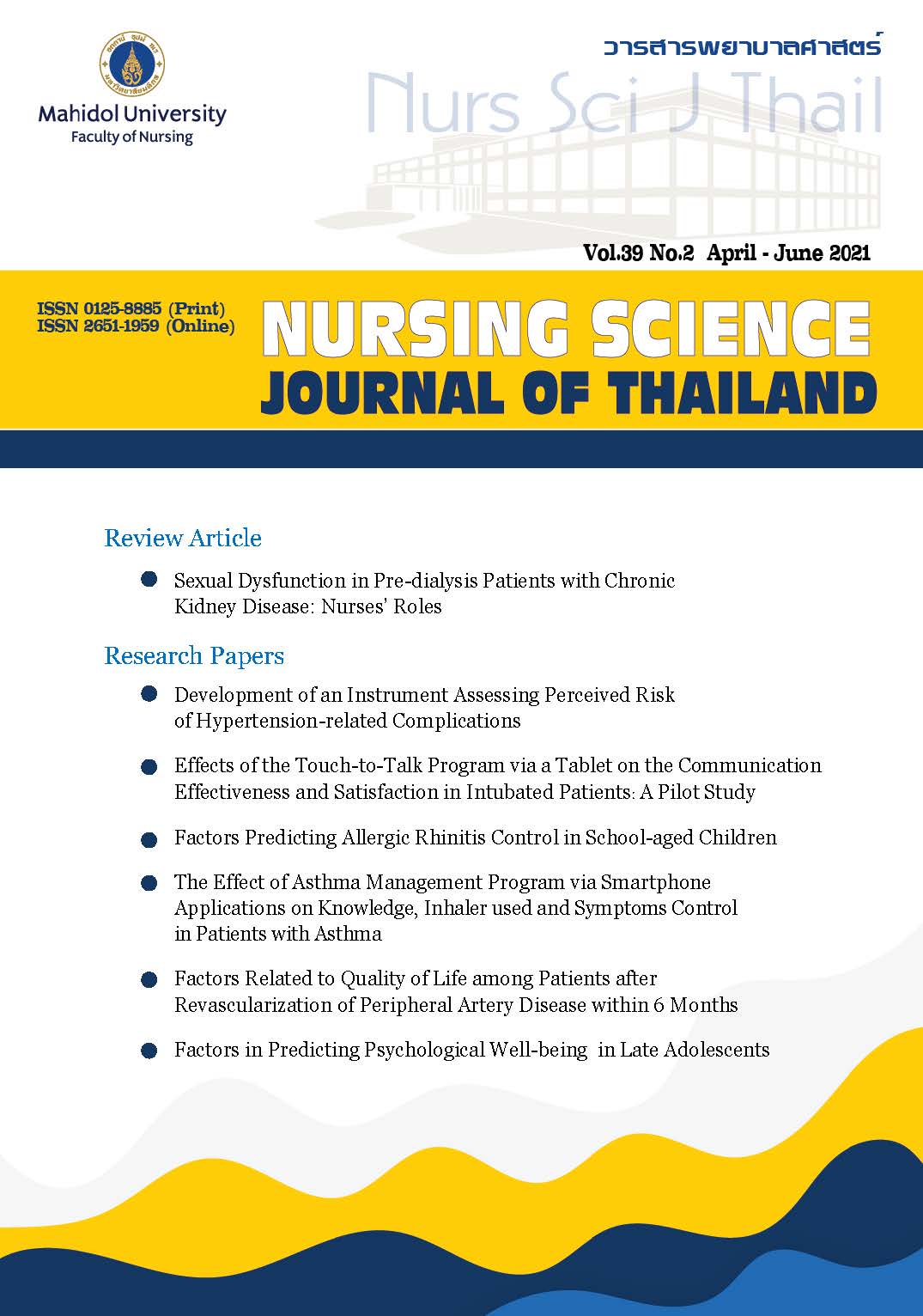Factor in Predicting Psychological Well-being in Late Adolescents
Main Article Content
Abstract
Purpose: This research aims to study the predictive power of perceived stress, resilience, social support, and coping strategies (problem-focused coping and emotional-focused coping) on psychological well-being in late adolescents.
Design: Predictive study.
Methods: Participants were 490 students with 10th to 12th grades in government schools in Bangkok. The instruments used in data collection consisted of personal information form, Ryff’s Psychological Well-Being Scale, Perceived Stress Scale, Connor-Davidson Resilience Scale, Multidimensional Scale of perceived social support, and the Brief COPE inventory. Data were analyzed by multiple linear regression.
Main findings: The study results showed that perceived stress, resilience, social support, and coping strategies (problem-focused coping and emotional-focused coping) could predict psychological well-being in late adolescents with statistical significance and all factors could account for 63% of the variance explained in psychological well-being (R2 = .63).
Conclusion and recommendations: All study factors were statistically significant predictors of psychological well-being in late adolescents. The study results can be used as the basis for activities to promote mental well-being in late adolescents through promoting the stress management skill and activities that help increase social support awareness.
Article Details
Copyright Notice: Nursing Science Journal of Thailand has exclusive rights to publish and distribute the manuscript and all contents therein. Without the journal’s permission, the dissemination of the manuscript in another journal or online, and the reproduction of the manuscript for non-educational purpose are prohibited.

Disclaimer: The opinion expressed and figures provided in this journal, NSJT, are the sole responsibility of the authors. The editorial board bears no responsibility in this regard.
References
Sathrapanya C, Hhempan W. Stress among students in university. Journal of Liberal Arts, Maejo University. 2013;1(1):42-58. (in Thai).
Vatanasin D. Prevention of adolescent depression: from evidence to practice. The Journal of Faculty of Nursing Burapha University. 2016;24(1):1-12. (in Thai).
Department of Mental Health, Ministry of Public Health. Report department of mental health pubic in 2019. Nonthaburi: Department of Mental Health; 2019 [cited 2020 Jun 30]. Available from: https://www.dmh.go.th/report/dmh/rpt_year/dl.asp?id=457. (in Thai).
Panyawong W, Santitadakul R, Pavasuthipaisit C. Prevalence of depression and suicidal risks in Thai adolescents: a survey in schools from 13 Public Health Region. Journal of Mental Health of Thailand. 2020;28(2):136-49. (in Thai).
Auerbach RP, Admon R, Pizzagalli DA. Adolescent depression: stress and reward dysfunction. Harv Rev Psychiatry. 2014;22(3):139-48. doi: 10.1097/HRP.0000000000000034.
Ryff CD, Keyes CL. The structure of psychological well-being revisited. J Pers Soc Psychol. 1995;69(4):719-27. doi: 10.1037//0022-3514.69.4.719.
Hezomi H, Nadrian H. What determines psychological well-being among Iranian female adolescents? Perceived stress may overshadow all determinants. Health Promot Perspect. 2018;8(1):79-87. doi: 10.15171/hpp.2018.10.
Akbari A, Khormaiee F. The prediction of mediating role of resilience between psychological well-being and emotional intelligence in students. International Journal of School Health. 2015;2(3):e26238. doi: 10.17795/INTJSH-26238.
Gardner AA, Webb HJ. A contextual examination of the associations between social support, self-esteem, and psychological well-being among Jamaican adolescents. Youth Soc. 2019;51(5):707-30. doi: 10.1177/0044118X17707450.
Mayordomo-Rodriguez T, Melendez J, Viguer P, Sales-Galan A. Coping strategies as predictors of well-being in youth adult. Soc Indic Res. 2015;122:479-89. doi: 10.1007/s11205-014-0689-4.
Grotberg E. A guide to promoting resilience in children: strengthening the human spirit. The Hague, Netherlands: Bernard van Leer Foundation. 1995. 56 p.
Yamwong P. A study of social support affect life satisfaction among Thammasat University students [master’s thesis]. Bangkok: Srinakharinwirot University; 2012. 109 p. (in Thai).
Lazarus R, Folkman S. Stress appraisal and coping. New York: Springer Publishing; 1984. 456 p.
Thavorn T, Pimroon S, Thanoi W. Correlated factors of psychological well-being among high school students. Journal of Nursing Science. 2018;36(3):59-70. (in Thai).
Poogpan J, Wacharasin C, Deoisres W. A comparison of psychological well-being between HIV-positive and HIV-negative adolescent AIDS orphans. Journal of Boromarajonani College of Nursing, Bangkok. 2016;32(3):87-95. (in Thai).
Klainin-Yobas P, Thanoi W, Vongsirimas N, Lau Y. Evaluating the English and Thai-versions of the psychological well-being scale across four samples. Psychology. 2020;11(1):71-86. doi: 10.4236/psych.2020.111006.
Cohen S, Kamarck T, Mermelstein R. A global measure of perceived stress. J Health Soc Bebav. 1983;24(4):385-96. doi: 10.2307/2136404.
Wongpakaran N, Wongpakaran T. The Thai version of the PSS-10: an investigation of its psychometric properties. Biopsychosoc Med. 2010;4:6. doi: 10.1186/1751-0759-4-6.
Connor KM, Davidson JR. Development of a new resilience scale: The Connor-Davidson Resilience Scale (CDRISC). Depress Anxiety. 2003;18(2):76-82. doi: 10.1002/da.10113.
Vongsirimas N, Thanoi W, Klainin-Yobas P. Evaluating psychometric properties of the Connor-Davidson resilience scale (10-item CD-RISC) among university students in Thailand. Journal of Nursing Science. 2017;35(3):25-35. (in Thai).
Zimet GD, Dahlem NW, Zimet SG, Farley GK. The multidimensional scale of perceived social support. J Person Assess. 1988;52(1):30-41. doi: 10.1207/s15327752jpa5201_2.
Boonyamalik P. Epidemiology of adolescent suicidal ideation: roles of perceived life stress, depressive symptoms, and substance use [dissertation]. Baltimore (MD): Johns Hopkins University; 2005. 422 p.
Carver CS. You want to measure coping but your protocol’s too long: consider the brief COPE. Int J Behav Med. 1997;4(1):92-100. doi: 10.1207/s15327558ijbm0401_6.
Foster AD. Traumatic life events and symptoms of anxiety: moderating effects of adaptive versus maladaptive coping strategies [dissertations]. Johnson City, TN: East Tennessee State University; 2014. 2380 p.
Numsang T, Tantrarungroj T. Validity and reliability of the brief COPE inventory: Thai version. Journal of the Psychiatric Association of Thailand. 2018;63(2):189-98. (in Thai).
Ryff CD. Happiness is everything, or is it? Explorations on the meaning of psychological well-being. J Pers Soc Psychol. 1989;57(6):1069–81. doi: 10.1037/0022-3514.57.6.1069.


